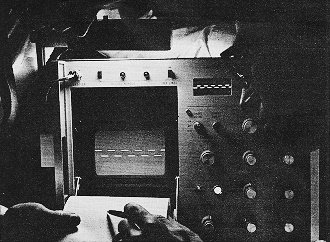|
June 1967 Radio-Electronics
 [Table of Contents] [Table of Contents]
Wax nostalgic about and learn from the history of early electronics.
See articles from Radio-Electronics,
published 1930-1988. All copyrights hereby acknowledged.
|
Here is what dominated the
electronics industry news cycle in 1967, per this June 19767 issue of Radio-Electronics
magazine's "News Briefs" column. A major concern of the Electronic Industries Association
was a serious lack of electronic service technicians, with no program in place to
attract and train a future workforce. The supply of newly available technicians
from military service was drying up since those entering the field after World War II
and the Korean War were already either engaged in the profession or had left it.
All India Radio received permission from the government to begin accepting
paid advertising for support. The Federal Communications Commission (FCC) was dealing
with a large increase in "pirate" radio stations broadcasting on licensed bands
(meaning loss of money for the FCC). It also passed a rule requiring type certification
on transmitters, and dope being smuggled inside electronic equipment ("dope scopes")
was experiencing an uptick.
News Briefs:
11/57 |
8/58 |
11/59 |
12/59 |
2/60 |
4/60 |
8/60 |
9/60 |
10/60 |
12/60 |
1/61 |
3/61 |
5/61 |
6/61 |
7/61 |
8/61 |
9/61 |
10/61 |
11/61 |
12/61 |
1/62 |
2/62 |
3/62 |
4/62 |
5/62 |
6/62 |
7/62 |
8/62 |
9/62 |
10/62 |
11/62 |
2/63 |
3/63 |
4/63 |
6/63 |
8/63 |
9/63 |
11/63 |
2/64 |
3/64 |
4/64 |
7/64 |
8/64 |
12/64 |
8/64 |
9/64 |
1/66 |
3/66 |
8/66 |
9/66 |
1/67 |
3/67 |
4/67 |
5/67 |
6/67 |
7/67 |
9/67 |
3/68 |
4/68 |
5/68 |
8/68 |
9/68 |
4/69 |
1/69 |
5/69 |
6/69 |
10/69 |
11/69 |
12/69
News Briefs
 Commercial Radio Overseas Commercial Radio Overseas
In January the Government of India announced that it had decided to allow commercial
advertising on All India Radio. The system will permit both spot announcements and
completely sponsored programs. Television advertising was approved in principle,
but no specific plan was announced at that time.
This column carried an item in the January 1967 issue to the effect that commercial
radio was about to start in Great Britain. That announcement was in error. A proposal
to that effect had been made in England, but it was not approved by the authorities.
The new popular radio service will be financed the same as radio has always been
in the United Kingdom-by a license fee on receivers.
The Vanishing Technician
The Electronic Industries Association is planning a program to attract and train
more electronic service technicians. They claim industry lacks from 50,000 to 75,000
technically trained people; the gap could increase to 400,000 in 10 years if preventive
measures aren't taken now.
At a recent conference of EIA's Consumer Products Division, the Executive Committee
appropriated up to $25,000 to explore the problem and determine various solutions
to it. Possibility: A technician-training program, supported by government agencies,
by manufacturers, or by foundations.
Electronics and the Law
During late February the FCC field office in New York City was baffled by a clandestine
radio station operating illegally in the 80-meter ham band. Calling itself "Radio
Free Harlem," the station transmitted popular music, tapes of religious services,
and appeals for contributions to a Harlem church.
Because the bootleg transmitter (operating around 3,800 kHz) stayed on the air
only about half an hour at a time, FCC direction finders were unable to pinpoint
its exact location. One official suggested the station might be in a car.
One March night, Commission engineers were off on a raid in their own back yard.
They caught more than 20 persons illegally operating CB stations in the Washington,
D.C. area. Some were unlicensed, but many were simply transmitting without mentioning
their call signs - and using code names.
Late in March, agents of the Federal Narcotics Bureau in New York City arrested
a 40-year-old importer in his lower Manhattan office. They opened a packing crate
containing a shipment of oscilloscopes just received from Paris. Hidden in the equipment
was 12 lb of pure heroin worth a quarter of a million dollars.
[Instruments are rumored to be known as DopeScope Model H.]
Finally, the FCC is considering the matter of type acceptance for class-D transmitters
in the Citizens Radio Service. At present such CB transmitters are not required
to be type accepted, although they may be, at the option of the manufacturer. It's
even permissible to construct your own transmitter and have it licensed by the Commission
as composite.
The FCC has proposed a rule change which would require that all new transmitters
be type-accepted. Manufacturers would have to make certain performance tests and
submit their data to the FCC for acceptance, before the transmitters could be used
on the Citizens band. Furthermore, after five years, no non-type-accepted transmitters
would be permitted on class-D frequencies.
The Commission's proposal also included a requirement for a modulation limiter
in new transmitters. [Hooray! -Editor]
Posted August 26, 2024
|









